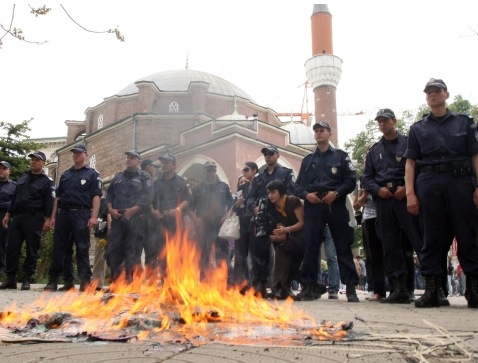
Bulgaria held European elections in June 2009, followed by the national parliament elections in July. The main political players are analysed by the american ambassador in Sofia Nancy McEldowney in two cables sent to Washington DC and reported by the investigative journalism site Bivol, a local partner of Wikileaks. [09SOFIA301] [09SOFIA264]
The cables give a rough picture of a political landscape plagued by corruption, shady businessmen, vote buying and accused criminals running for MP.
Bulgarian media stressed the direct translation of the title "Garbage in, Garbage out", adding that not all of the Bulgarian MPs deserve to be named "garbage", but many of them are looking after their private interests first, through heavy lobbying. "Now, it's up to them to reject this qualification. With a radical change" - popular daily "Troud" wrote in an OpEd.
English language site Novinite stressed the comparison of Ataka (Attack) party and the ethnic Turkish Movement for Rights and Freedoms. They are each other's "best enemies", according to the cable.
"Local analysts say Ataka and MRF need each other to frighten their constituents into voting." the cable says.
Currently, Ataka is the ruling centrist-right GERB's only parliamentary ally.
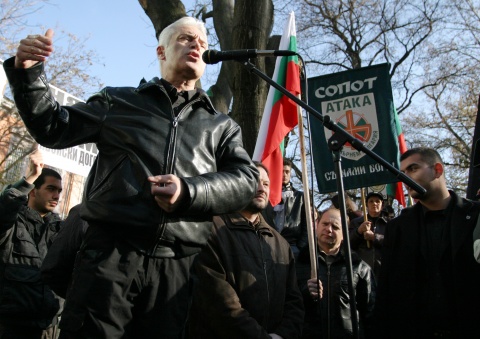
Diplomatic cables of the US embassy in Sofia have been revealed on WikiLeaks and provided to the project for investigative journalism www.bivol.bg, bringing out new details about the way Bulgaria's far-right, nationalist Ataka party and its leader, Volen Siderov, are viewed by American diplomats.
The text in English has also been published at the Balkanleaks site, an analogue of the notorious whistle-blowing WikiLeaks.
The first available cable on the subject has been sent on July 12, 2005, by then US Ambassador to Sofia, James Pardew, after it became known Ataka had secured seats in the Parliament as result of the general elections. In the cable, titled BULGARIA: EXTREME NATIONALIST PARTY ENTERS PARLIAMENT, the diplomat writes about the policies of Ataka and Siderov, seen by him as xenophobic and anti-semitic, points out Ataka's parliamentary group includes a significant number of former military and police officials, gives a summary of Siderov's biography and work as journalist, talks about other key figures in the party and and notes undisclosed sources have informed him the nationalists might have received funding from Overgaz Chief Sasho Donchev and Nove Holding owner Vassil Bozhkov aka The Scull.
In a cable, dated October 17, 2005, titled PROGRESS ON U.S. MILITARY ACCESS, BUT TOUGH ISSUES REMAIN, the then Charge d'Affaires of the US Embassy Jeffrey D. Levine points out the nationalists lead an anti-American campaign regarding US military bases.
 FROM THE CABLES/GITMO FILES
FROM THE CABLES/GITMO FILES
Dominique Strauss-Kahn may be just one of many diplomats or international officials alleged to have abused maids or nannies in the United States:
In April 2007, a Tanzanian maid filed a lawsuit against Alan Mzengi, a minister-counselor at the Tanzanian Embassy. She alleged the Mzengis kept her as “a virtual prisoner in their residence, stripping her of her passport, refusing to permit her to leave the house unaccompanied.” The lawsuit states she was not paid for her four years of work.
On this case, Reuters reports a US State Embassy cable from December 2009 shows the US government asked the Tanzanian government to investigate saying, “While payment of the lost wages to Ms. Mazengo is our first priority, we also hope that any diplomat who has treated his domestic staff in such an abusive manner would face appropriate sanction upon his return home," the cable said.
The State Department continues to monitor a possible Tanzania investigation and claims it will be getting “tough on alleged abuse of domestic workers by foreign diplomats.”
Cables deal with Canadian electricity:
One story out from CBC reports that Prince Edward Island utility Maritime Electric was part of Hydro-Québec's plans for purchase of NB Power. In October 2009, as the New Brunswick government was considering a $4.8 billion deal that was politically unpopular, the possibility of a sale was denied. The cables show it was seriously considered.
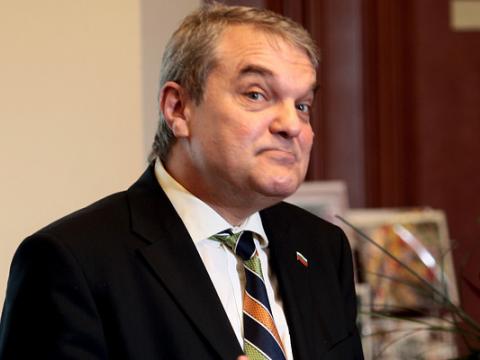
Former Interior Minister of Bulgaria (2005-2008), Rumen Petkov is presented as a "hard working, hard drinking", controversial figure, related to political corruption and russian intelligence in a WikiLeaks diplomatic cable released by the Wikileaks partner Bivol.bg also published on balkanleaks.eu
Before his appointment as a Minister, Petkov was the mayor of the central Bulgarian city of Pleven where he was "dogged by scandals, some serious and some -- like his late night arrest for urinating in a public fountain --simply illustrative of his unpolished style" - wrote the American ambassador in Sofia.
Rumen Petkov became one of the most influential personalities in the Bulgarian government under PM Stanishev (2005-2009).
His past associations with controversial figures may make it difficult for him to move against certain Organized Crime interests - the Ambassador John Bayrle reported. He also believes Petkov has "long been publicly associated with Russians who are either directly or indirectly affiliated with Russian intelligence,"
While Petkov was a Minister "The five largest organized crime groups in Bulgaria (TIM, VIS, SIC, Nove Holding, and Multigroup) ... generally operated with impunity," Bayrle stated.
Petkov resigned in April 2008 after a huge political scandal following the revelation that he met with The Galevi Brothers, alleged drug lords. Despite the strong evidence that Petkov protected alleged criminals and shady alcool business from justice, Petkov was never investigated by the prosecutor office.
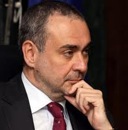
Bivol.bg (partial translation)
Bulgarian Chief Prosecutor, Boris Velchev, has painted an apocalyptic picture of the state of the prosecution services in the country at a meeting with American Ambassador, John Beyrle, held soon after Velchev’s election to the post. This has been revealed in a cable written by Beyrle, dated February 7, 2006, and leaked by Wikileaks [06SOFIA198].
The prosecutor’s office under the leadership of Velchev’s predecessor, Nikola Vilchev, was described by the new Chief Prosecutor as "some kind of terrorist organization" used to settle political and business scores, but totally incapable of fighting crime.
Empty files and hostile deputies, who did not even want to talk to him, is what Velchev stumbled upon at the prosecution services. He had described his priority of cleansing the institution from corrupt prosecutors as "some kind of a war".
Velchev’s “war,” however, has implications beyond the borders of Bulgaria – it must lead to effective guilty verdicts of organized crime bosses, one of the top requirements of the EU, monitoring Bulgaria before its accession to the Union.
Facing the outrageous failure of Bulgarian prosecutors and law enforcement to collect sound evidence against the leaders of organized crime, the Chief Prosecutor declares, according to Bayrle, his equally outrageous plan to seek “a contract with the Courts.” Ambassador Beyrle explains this means appealing to judges to sentence criminal bosses “based on evidence that otherwise might not pass muster“.
Alexandre Lévy, Western Balkans
Des responsables français en armement ont certainement suivi le départ du Druzki, la frégate un peu vétuste que Sofia vient d'envoyer au larges des côtes libyennes dans le cadre de l'opération alliée contre le régime de Kadhafi. Car le Druzki aurait pu être une corvette de classe Gowind, l'une des quatre que la France comptait vendre à la Bulgarie au prix d'un milliard de dollars US - soit pratiquement le double du budget annuel de la défense dans ce pays. Qu'est-ce qui a fait capoter ce "contrat du siècle" inclus dans l'ambitieux partenariat stratégique entre les deux pays signé par Nicolas Sarkozy à Sofia, le 4 octobre 2007, quelques semaines après l'euphorie de la libération des infirmières bulgares?
A lire les télégrammes diplomatiques américains de cette époque, révélés par les sites Bivol et BalkanLeaks , les partenaires locaux de WikiLeaks (cf. infra), il apparaît que les Bulgares ont surtout voulu temporiser, soufflant le chaud et le froid, dans le but de ne pas froisser Paris qui a joué un rôle actif dans la libération des infirmières. Beaucoup de responsables bulgares, y compris des militaires de haut rang, ne sont pas dupes : ils considèrent dès le départ cette acquisition comme vouée à l'échec, ces corvettes françaises dernier cri étant considérées comme un luxe inutile pour la marine bulgare.
Mais, plus que tout, la lecture de ces câbles illustre les efforts que Washington déploie pour dissuader les Bulgares d'honorer ce contrat contraire, selon eux, aux intérêts stratégiques de Sofia. Et surtout, des Etats-Unis, qui font un intense lobbying en faveur de l'achat par la Bulgarie de matériel américain d'occasion - notamment des avions de combat multifonctions.
Réformes bulgares, opportunités américaines
May 3, Global Press Freedom Day
Bulgaria’s ranking in freedom of press, published by Freedom House on the eve of May 3, the global press freedom day, is slipping down once again. Even though the country went down by just one spot, compared to last year, the trend that began in 2005 is continuing. A trend which can be noticed in the rankings of another large human rights organization “Reporters without Borders.”
The reasons for this trend are complex and have been analyzed in detail in the report on Bulgaria of Reporters without Borders, published in February 2009. It stresses on “power reflexes,” inherited by the totalitarian pass; economic pressure on journalists; murky ownership of large media and the role of the shady groups, striking terror of physical retribution with the non-conformists.
Several months later, in the eve of the general elections, American Ambassador Nancy McEldowney sends a classified report to the State Department, focused on Bulgarian media [09SOFIA304], where the diagnosis is harsh and the language far away from diplomatic: venality, corruption, political servitude, paid for with dirty money from the gray economy.
An interview with Julian Assange for the Bulgarian site for investigative journalism Bivol.bg - Wikileaks media partner.

On Cablegate
Bivol: WL started Cablegate with the partnership of five top international media outlets. Are you happy with this model? What are the limitations of this approach?
Boyko Borisov complained about Putin to the Americans; RWE had been “sabotaged” to give up on Belene NPP project.
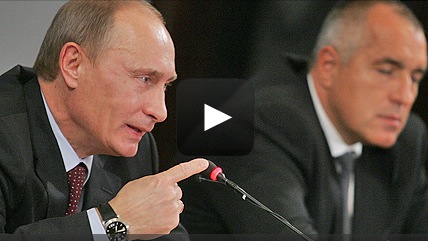
Bulgarians "risk being cold" this winter if the government did not move forward with the Russian energy projects. This is what Russian Prime Minister, Vladimir Putin said, off-the-record, to his Bulgarian counterpart, Boyko Borisov, during the summit in Gdansk in September, 2009. The tone of the sentence in question is not clear, we cannot judge if it was threatening enough, but obviously it seriously impressed Borisov in order for him to report it in a timely manner and for Putin’s words to find their place in the classified documents of the American diplomacy.
Borisov’s complaint about Putin’s attitude is described in a US diplomatic cable, dated October 5, 2009, released by Wikileaks [09SOFIA561]. The text does not elucidate if this has been a joke or a threat. On September 29, 2009, Borisov had asked the US government for assistance in the diversification of energy sources for Bulgaria.
“The cash-strapped new administration seeks not only to rid itself of projects of questionable commercial viability but also to increase its energy security through diversification,” the American diplomats believe.
The cable talks about the meeting between the Prime Minister and three large US energy companies, held on that same date. As a result, the government had made the commitment to engage in negotiations to use US technology to diversify its nuclear fuel supply and create a spent nuclear fuel storage facility.
Бойко Борисов се оплаквал от Путин на американците RWE е "саботирана" да се откаже от Белене
Ако няма напредък в придвижването на руските енергийни проекти, българите "рискуват да останат на студено през зимата". Това е казал руският премиер Владимир Путин "на ухо" на българския си колега Бойко Борисов, извън протокола, на срещата на високо равнище в Гданск на 1 септември 2009 г. Не става ясно с какъв тон е споменато въпросното изречение, т.е. дали е било достатъчно заплашително, но явно е направило сериозно впечатление на Борисов, за да бъде своевременно докладвано и да попадне в конфиденциалните информации на дипломацията на САЩ.
"Оплакването" на Бойко Борисов за отношението на Путин е отразено в американска дипломатическа телеграма датирана от 5 октомври 2009 г., разкрита от Wikileaks [09SOFIA561]. От текста не е ясно дали става въпрос за шега, или за заплаха. На 29 септември 2009 г. Борисов е поискал помощ от правителството на САЩ относно диверсификацията на енергийните източници за България. "Финансово закъсалата нова администрация не цели само да се отърве от проекти със съмнителна търговска жизнеспособност, но и да увеличи сигурността на енергийните доставки чрез диверсификация.", вярват американските дипломати.
Докладът разказва за среща на министър-председателя с три големи енергийни компании на САЩ на същата дата. В резултат на това правителството се е ангажирало в преговори да се използва тяхна технология за диверсификация на ядреното гориво и за утилизация на отработеното ядрено гориво.
Докладът разкрива, че американците са се надявали Бойко Борисов да спази обявените си официално намерения преди да поеме властта: да се преразгледат всички руски проекти свързани с големи енергийни сделки, направени от Тройната коалиция. Както показа времето обаче случи се точно обратното и ролята на премиера в началото на мандата му се оказа фалшива.

A set of cables about Bulgarian energy business, published by the Wikileaks media partner Bivol.bg, discloses a realm of "energy mafia", murky intermediaries, connected with organized crime, and Russian financial interests.
The cables reveal how Russia was blackmailing Bulgarians to advance the construction of new pipelines for Russian gas and oil, and of a new nuclear power plant in Belene (the only Russian project of this type in EU).
Describing his September 1, 2009, meeting with Putin in Gdansk, Borissov said Putin implied (in an off-the-record remark) that Bulgarians "risk being cold" during the upcoming winter if Borissov did not move forward with the projects.
Bulgaria is 100% dependent from Russian gas and nuclear fuel and was the most affected country during the gas supply cuts in 2009.
Translation of the full analysis by Bivol.bg will follow shortly.
Two weeks after the publishing of the full, unedited version of a diplomatic cable exposing the total invasion of Bulgarian economics and politics by the organized crime, the topic seems to be closed for Bulgarian media.
Bulgaria is known to have one of the most censored media in the European Union. In the last press freedom index of Reporters without Borders, the country shares the 70th ranking with Benin, Kenya and Greece.
One of the reasons for such low freedom of speech standards is shady media ownership. As the US ambassador reports in the cable, figures connected to organized crime own, directly or indirectly, the country’s mainstream printed and electronic media. This results in censorship and self-censorship on topics about the ties between the Mafia and the politics.
The media reaction, after the cable on organized crime was published, went through the classic way of dealing with such scandalous information: 1. Ignore it 2. Ridicule it 3. Fight it... then return to number 1.
1. Ignore it: The initial publication of the unedited cable on the Bivol independent investigative journalism web site was only reprinted in few independent blogs and web sites, most of them edited from abroad: (Ivo Indzhev, Eurochicago, Kafene). Only one big Bulgarian newspaper printed a link to the publication in a short article. The content of the cable, however, was greatly commented on and cited in online forums.
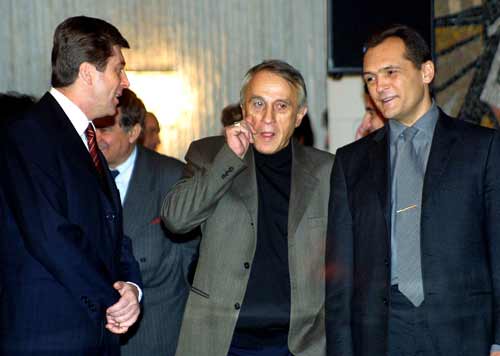
In June 2003, the Bulgarian weekly Kapital published an article about the privatization of "Atomenergoremont" - the Bulgarian State-owned company, (the only one), maintaining the Kozloduy Nuclear Power Plant. Under the suggestive title "Criminal Radiation," it exposed the main competing candidates: Vasil Bozhkov Aka "The Scull" and Konstantin Dimitrov AKA "Samokovetza,” both known as controversial figures, suspected of criminal activities.
Just a few months later, Konstantin Dimitrov Samokovetza was shot dead in Amsterdam by a contract killer. As for Atomenergoremont, it was sold to the "Bulgarian Energy Company" owned by Hristo Kovachki, the next controversial businessman, who is currently on bail over accusations of tax evasion.
However, the Wikileaks unedited cable recently revealed that James Pardew, the American ambassador to Sofia at the time, wrote in 2005 that Vasil Bozhkov "is believed to control “Risk Engineering,” another key firm in the Bulgarian nuclear business. On the other hand, Ambassador Pardew also reported that Bozhkov is considered to be the ringleader of an organized crime group. "Bozhkov's illegal activities include money laundering, privatization fraud, intimidation, extortion and racketeering," the cable notes.
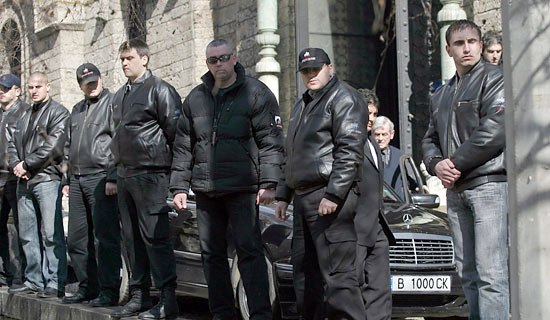
В края на декември 2010 г. сайтът Wikileaks даде начало на скандала Cablegate: публикацията на 251 287 секретни американски дипломатически телеграми. До този момент в сайта са публикувани 5000 телеграми или около 2% от цялата база. Осем от публикуваните до момента телеграми са от американското посолство в София.
Общо в базата данни на Wikileaks има 978 дипломатически телеграми от посолството на САЩ в София. В още 66 грами от други посолства се среща етикетът Bulgaria.
На 1 декември 2010 г. Гардиън публикува в сайта си дипломатическа телеграма на американското посолство в София за организираната престъпност в България.
На 7 декември 2010 Монд публикува обзорен материал за влиянието на руската мафия в Европа, в който също се цитира грамата, подписана от посланик Джеймс Пардю.
От статията в Монд научаваме също, че има и друга телеграма датирана от 11 септември 2009 г., която също е посветена на българската организирана престъпност. В нея има раздел "Руска връзка", където се коментира представителят на Майкъл Чорни в България – адвокатът Тодор Батков. Посолството подчертава неговите солидни политически връзки и факта, че през 2008 г. е награден от президента Георги Първанов с най-високото държавно отличие орден „Стара планина”.
Десет дни след публикацията в Монд, на 17 декември 2010 в сайта на Wikileaks беше публикуван цензурираният от Гардиън текст на дипломатическата телеграма от 7 юли 2005, подписана от посланик Джеймс Пардю.
Текстът на телеграмата от септември 2009 така и не видя бял свят и до този момент единствено журналистите от изданията акредитирани от Wikileaks са запознати с него.

Bulgarian translation here.
As described in an article on WL Central yesterday, 2011-03-17 Unredacted cable from Sofia shows the total invasion of the state by organized crime, a cable which had 3/4 of its text redacted by the Guardian has now been published in full. This WL Central writer is also a member of the web site Bivol which published the unredacted cable.
Why did The Guardian and Le Monde Conceal Information about Crime in Bulgaria?
The stated policy of Wikileaks is to not publish the original texts of the cables, but rather censored versions, edited by the teams of their partner media, after the latter have examined the content of the documents. This way media, known for their professionalism and good reputation, offer a guarantee the names of informers and third parties and their identities would not be revealed.
Wikileaks have chosen this model in order to not endanger the lives of intelligence agents and informers as it happened after the publication of documents about the US and its allies’ military operation in Afghanistan. At the time, even staunch supporters of freedom of speech, such as “Reporters without Borders,” voiced strong and grounded criticism of Julian Assange.
One cannot help it, but note that in the published cable from July 7, 2005, the section “Who Is Who in Bulgarian Organized Crime” abounds with censored paragraphs. We can only guess the reason of the Guardian journalists to conceal individuals and businesses the Embassy believes are part of organized crime. The names of these individuals and businesses, along with information about alleged ties with organized crime, are nothing new for the Bulgarian and international audience.
Analysis of unedited cable: 2011-03-18 Bulgarian Organized Crime Uncensored
2011-03-19 Bulgarian "Criminal Radiation" Leaks from Unedited Wikileaks Cable
Bulgarian translation of both articles here.
UPDATE: The Wikileaks site has now been updated with the uncensored version of the 05SOFIA1207 cable. The full text scores 5226 words compared to the 1406 words in the Guardian redacted version published on December 1 2010. The redactions are shown clearly here (thanks to commenter rhill for pointing it out). The parts that were redacted are green.
At the end of November, 2010, Wikileaks triggered the Cablegate scandal: the release of 251 287 secret American diplomatic cables. Currently, the site has published 5 000 cables or about 2% of the entire database. Eight of them are from the American Embassy in Sofia.
The Wikileaks site has a total of 978 diplomatic cables from the US Embassy in Sofia. There are another 66 cables with the tag Bulgaria.
On December 1, 2010, The Guardian published on its site the diplomatic cable of the American Embassy in Sofia dedicated to organized crime in Bulgaria.
On December 7, 2010, Le Monde published an overview about the influence of Russian mafia in Europe, also citing the cable, signed by then Ambassador to Sofia, James Pardew.
Bulgarian citizens concerned about a corruption scandal involving the country’s prime minister sent through the media today an appeal to EU employees to leak the report submitted by the Bulgarian Justice Ministry to the authorities in Brussels, because this report has been kept secret from the media and Bulgarian society.
Theme by Danetsoft and Danang Probo Sayekti inspired by Maksimer